Unit 5 Humans and Nature Lesson 1 A Sea Story Grammar课件-(共30张PPT)高中英语北师大版(2019)必修第二册
文档属性
| 名称 | Unit 5 Humans and Nature Lesson 1 A Sea Story Grammar课件-(共30张PPT)高中英语北师大版(2019)必修第二册 | 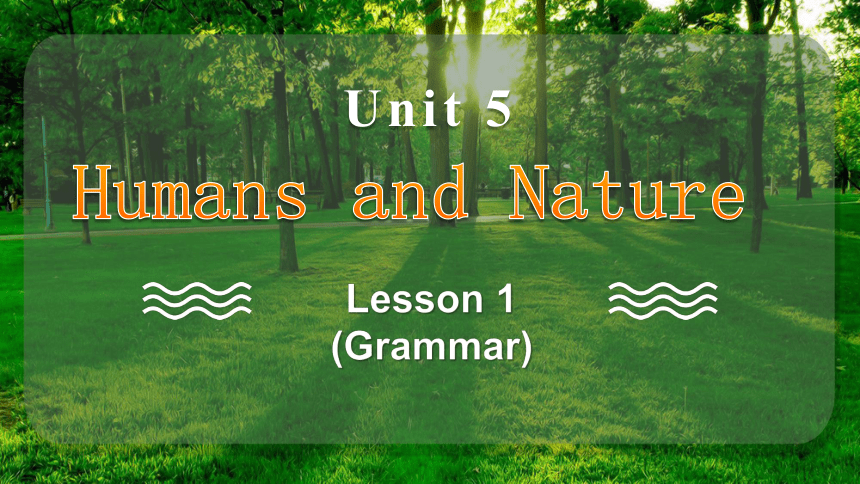 | |
| 格式 | pptx | ||
| 文件大小 | 26.0MB | ||
| 资源类型 | 教案 | ||
| 版本资源 | 北师大版(2019) | ||
| 科目 | 英语 | ||
| 更新时间 | 2025-08-01 11:00:21 | ||
图片预览

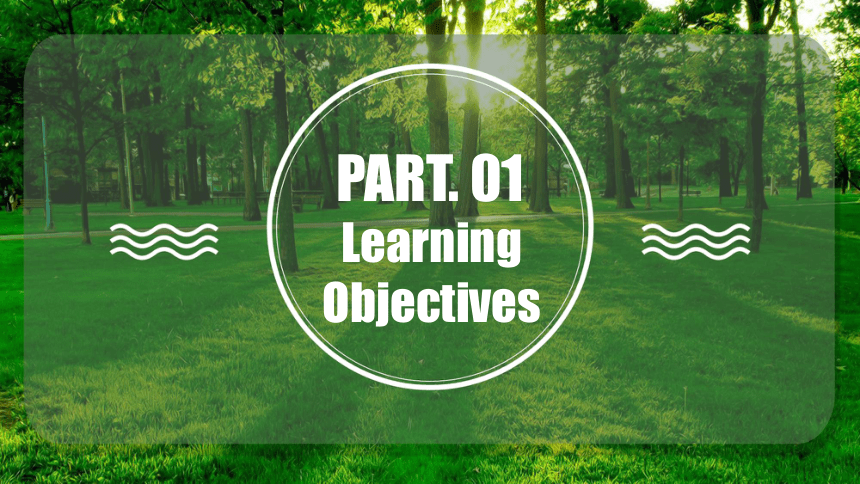
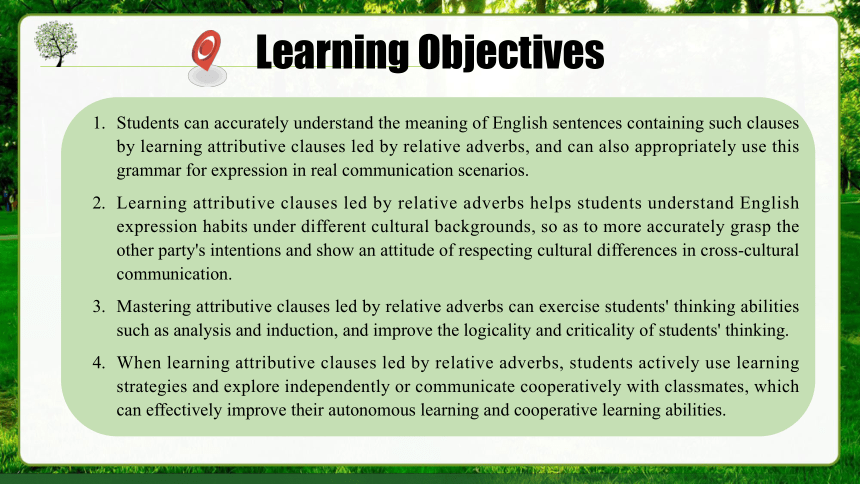
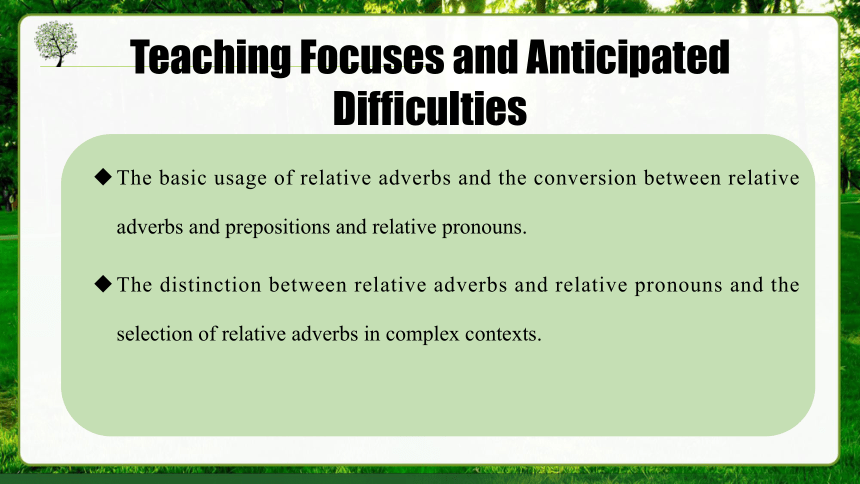

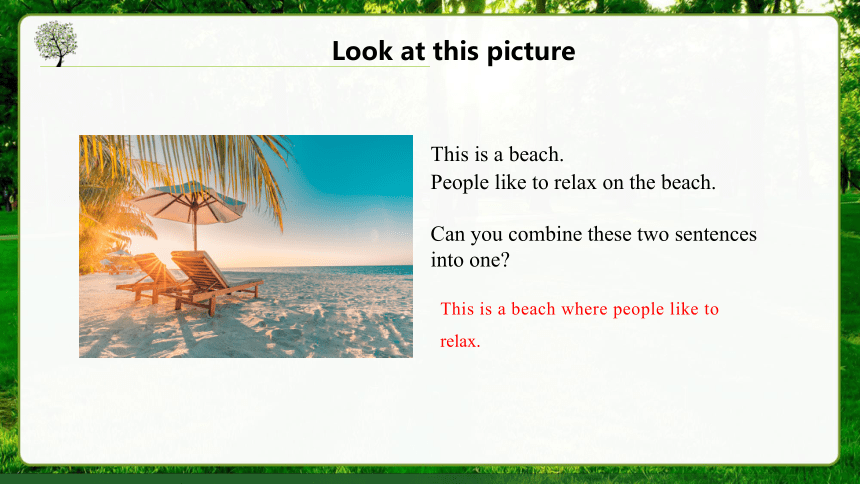
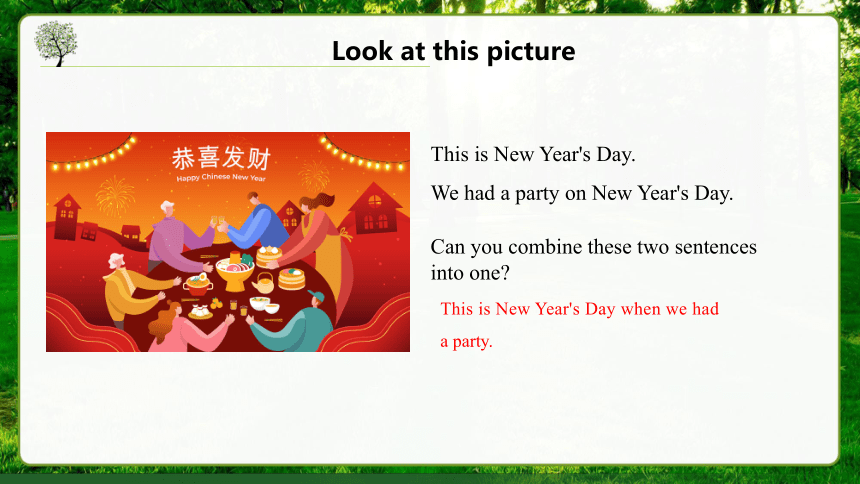
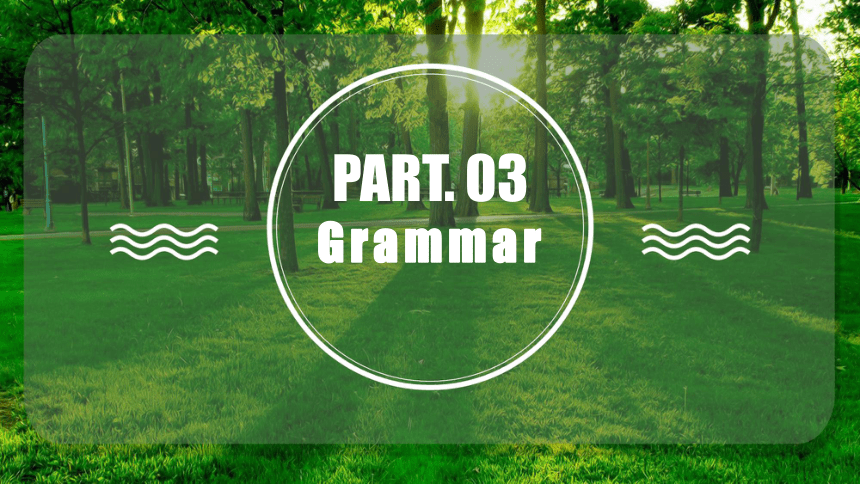
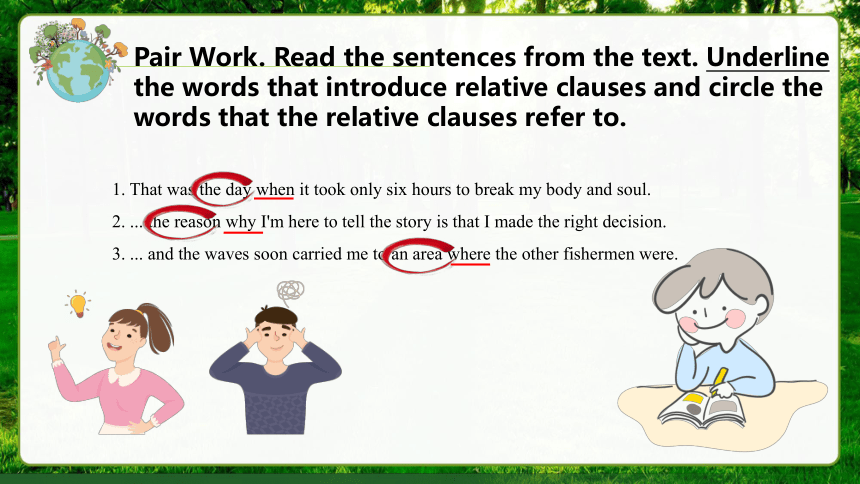
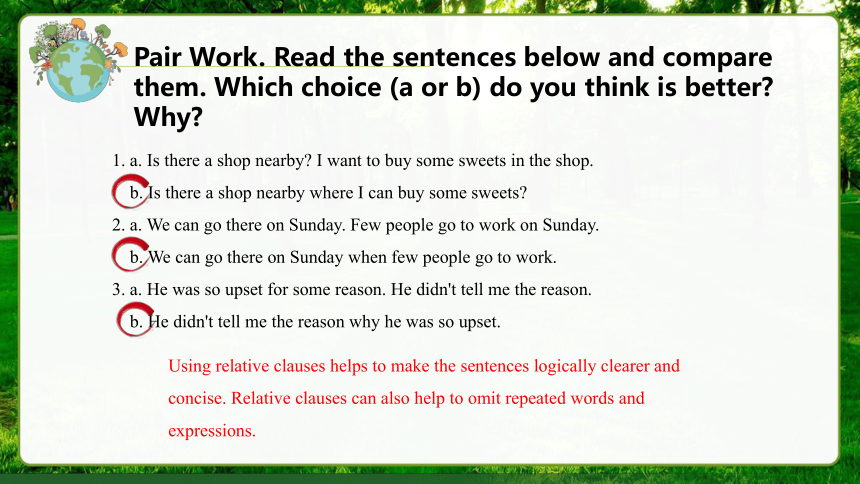
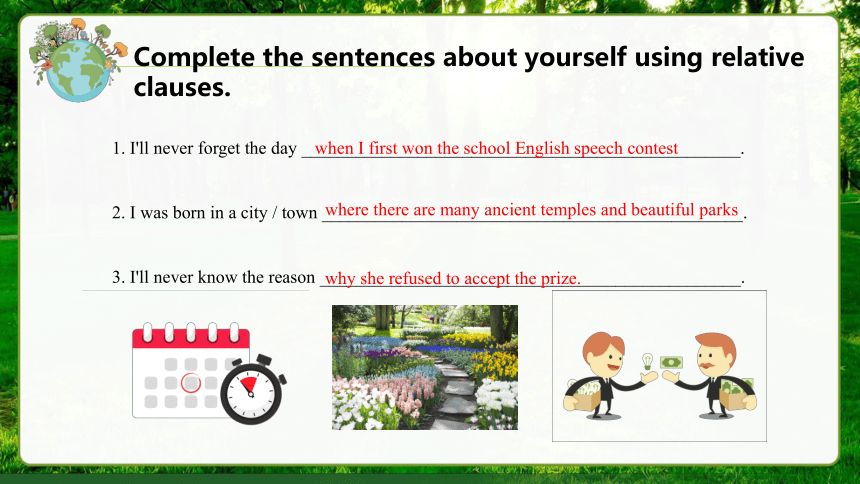
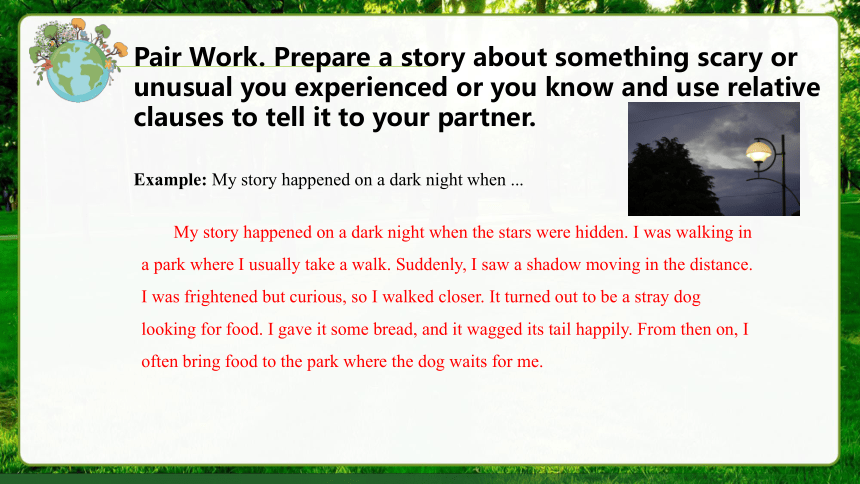
文档简介
(共30张PPT)
Humans and Nature
Unit 5
Lesson 1
(Grammar)
PART. 01
Learning Objectives
Learning Objectives
Students can accurately understand the meaning of English sentences containing such clauses by learning attributive clauses led by relative adverbs, and can also appropriately use this grammar for expression in real communication scenarios.
Learning attributive clauses led by relative adverbs helps students understand English expression habits under different cultural backgrounds, so as to more accurately grasp the other party's intentions and show an attitude of respecting cultural differences in cross-cultural communication.
Mastering attributive clauses led by relative adverbs can exercise students' thinking abilities such as analysis and induction, and improve the logicality and criticality of students' thinking.
When learning attributive clauses led by relative adverbs, students actively use learning strategies and explore independently or communicate cooperatively with classmates, which can effectively improve their autonomous learning and cooperative learning abilities.
Teaching Focuses and Anticipated Difficulties
The basic usage of relative adverbs and the conversion between relative adverbs and prepositions and relative pronouns.
The distinction between relative adverbs and relative pronouns and the selection of relative adverbs in complex contexts.
PART. 02
Lead-in
Look at this picture
This is a beach.
People like to relax on the beach.
Can you combine these two sentences into one
This is a beach where people like to relax.
Look at this picture
This is New Year's Day.
We had a party on New Year's Day.
Can you combine these two sentences into one
This is New Year's Day when we had a party.
PART. 03
Grammar
Pair Work. Read the sentences from the text. Underline the words that introduce relative clauses and circle the words that the relative clauses refer to.
1. That was the day when it took only six hours to break my body and soul.
2. ... the reason why I'm here to tell the story is that I made the right decision.
3. ... and the waves soon carried me to an area where the other fishermen were.
Pair Work. Read the sentences below and compare them. Which choice (a or b) do you think is better Why
1. a. Is there a shop nearby I want to buy some sweets in the shop.
b. Is there a shop nearby where I can buy some sweets
2. a. We can go there on Sunday. Few people go to work on Sunday.
b. We can go there on Sunday when few people go to work.
3. a. He was so upset for some reason. He didn't tell me the reason.
b. He didn't tell me the reason why he was so upset.
Using relative clauses helps to make the sentences logically clearer and concise. Relative clauses can also help to omit repeated words and expressions.
Complete the sentences about yourself using relative clauses.
1. I'll never forget the day _________________________________________________.
2. I was born in a city / town _______________________________________________.
3. I'll never know the reason _______________________________________________.
when I first won the school English speech contest
where there are many ancient temples and beautiful parks
why she refused to accept the prize.
Pair Work. Prepare a story about something scary or unusual you experienced or you know and use relative clauses to tell it to your partner.
Example: My story happened on a dark night when ...
My story happened on a dark night when the stars were hidden. I was walking in a park where I usually take a walk. Suddenly, I saw a shadow moving in the distance. I was frightened but curious, so I walked closer. It turned out to be a stray dog looking for food. I gave it some bread, and it wagged its tail happily. From then on, I often bring food to the park where the dog waits for me.
Grammar 关系副词引导的定语从句
概念:关系副词是引导定语从句的连接词,在从句中作状语,指代先行词(多为表示时间、地点、原因的名词),主要包括 when(表时间)、where(表地点)、why(表原因)三种。
Grammar 关系副词引导的定语从句
when 的用法:先行词为表示时间的名词(如 day, year, time 等),when 在从句中作时间状语,可理解为 “在那时”。
例如:I still remember the day when I first met her.(我仍然记得第一次见到她的那天。)
where 的用法:先行词为表示地点的名词(如 place, city, park 等),where 在从句中作地点状语,可理解为 “在那里”。
例如:This is the school where I studied for six years.(这是我读了六年书的学校。)
注:抽象地点名词如 situation, case, point 等也可用 where 引导,如:We’ve reached a point where we need to make a decision.(我们到了需要做决定的关头。)
Grammar 关系副词引导的定语从句
why 的用法:先行词只能是 reason,why 在从句中作原因状语,可理解为 “原因是”。
例如:Do you know the reason why he was late (你知道他迟到的原因吗?)
Divide into groups, everyone make similar sentences with "when", "where" or "why", and write them down.
Grammar 关系副词引导的定语从句
关系副词引导的定语从句与 “介词 + 关系代词” 的转换:
关系副词引导的定语从句可转换为 “介词 + which” 引导的定语从句,转换时介词需根据先行词或从句动词的搭配确定。
when → on/in/at + which: The day when I joined the club = The day on which I joined the club.
where → in/at/on + which: The house where I live = The house in which I live.
why → for which: The reason why he left = The reason for which he left.
Grammar 关系副词引导的定语从句
关系副词引导的定语从句与 “介词 + 关系代词” 的转换:
when → on/in/at + which: The day when I joined the club = The day on which I joined the club.
先行词是 the day(表示 “具体某一天”),英语中表示 “在某一天” 时,介词固定用 on(如 on Monday, on July 1st)。
这里的介词 “on” 由先行词 “day” 的搭配习惯决定,与从句动词 “joined” 无直接固定搭配,而是由 “day” 本身的时间属性(具体日期)决定。
Grammar 关系副词引导的定语从句
关系副词引导的定语从句与 “介词 + 关系代词” 的转换:
where → in/at/on + which: The house where I live = The house in which I live.
从句动词是 live,“live” 与地点搭配时,固定用介词 in(表示 “在…… 里面居住”,如 live in a house, live in a city)。
这里的介词 “in” 由从句动词 “live” 的固定搭配决定,即 “live in + 地点”,因此转换时用 “in which”。
Grammar 关系副词引导的定语从句
关系副词引导的定语从句与 “介词 + 关系代词” 的转换:
why → for which: The reason why he left = The reason for which he left.
先行词是 the reason,英语中表示 “…… 的原因” 时,常用搭配是 “the reason for...”(如 the reason for the accident)。
同时,从句动词 “left” 与 “reason” 搭配时,逻辑上表示 “他离开的原因”,即 “for the reason(出于某个原因)”,介词 “for” 既符合先行词 “reason” 的搭配习惯,也符合 “reason 与动作的逻辑关系”(表 “目的 / 原因”)。
Grammar 关系副词引导的定语从句
介词选择的核心原则:
若先行词是时间名词(day, month, year 等),介词多由时间名词本身的属性决定(如具体某天用 on,月份 / 年份用 in)。
若先行词是地点名词(house, city, park 等),介词多由从句动词与地点的搭配决定(如 live in, stay at, stand on)。
若先行词是 reason,介词固定用 for,因 “the reason for...” 是固定搭配,表 “…… 的原因”。
Grammar 关系副词引导的定语从句
与关系代词的区分:
关键看先行词在从句中所作的成分:若作状语(时间、地点、原因),用关系副词;若作主语、宾语或表语,用关系代词(which, that, who 等)。
例如:
This is the park where I played.(played 后无宾语,park 在从句中作地点状语,用 where)
This is the park which I visited.(visited 后缺宾语,park 在从句中作宾语,用 which)
易混
Grammar 关系副词引导的定语从句
常见误区:
1. 忽略抽象地点名词用 where:如 situation, stage 等,需根据语境判断是否表 “抽象地点”。
2. 滥用 why:why 仅用于先行词为 reason 的情况,其他原因需用 “for which”。
3. 转换介词错误:需根据动词搭配或先行词含义确定介词(如 in the day, at the time)。
易混
PART. 04
Exercise
Choose appropriate relative adverbs for the following attributive clauses.
1. The difficult year __________ he finally graduated from university with honors was a great turning point in his long and challenging life.
2. Is there a small shop near here __________ I can buy a thick notebook and a few black pens before the afternoon class starts
3. No one knows the exact reason __________ the important science experiment failed despite the scientists’ repeated careful attempts last month.
4. I’ll never forget the exciting day __________ our school basketball team won the national competition after a tough final match.
when
where
why
when
Fill in the blanks with suitable prepositions and relative pronouns.
1. I still remember the cold winter morning __________ we first met at the crowded school gate while waiting for the early bus.
2. This is the quiet small town __________ my grandparents have lived happily with their neighbors for over fifty years since they got married.
3. Do you know the real reason __________ she suddenly refused to attend the important annual meeting held in the company’s conference room yesterday
4. Last weekend, we visited the famous local museum __________ many precious ancient artifacts from the Ming Dynasty are on display in the glass cases.
on which
in which
for which
in which
PART. 05
Summary
添加标题
ADD THE TITLE HERE
Lesson 1 (Grammar)
关系副词引导的定语从句
常见的引导的定语从句的关系副词及其用法
“介词 + 关系代词”的转换
与关系代词的区分
关系副词引导的定语从句的概念
PART. 06
Homework
Homework
Write several attributive clauses led by relative adverbs with your partner, and then convert them into "preposition and relative pronoun" structures.
See you next class!
Humans and Nature
Unit 5
Lesson 1
(Grammar)
PART. 01
Learning Objectives
Learning Objectives
Students can accurately understand the meaning of English sentences containing such clauses by learning attributive clauses led by relative adverbs, and can also appropriately use this grammar for expression in real communication scenarios.
Learning attributive clauses led by relative adverbs helps students understand English expression habits under different cultural backgrounds, so as to more accurately grasp the other party's intentions and show an attitude of respecting cultural differences in cross-cultural communication.
Mastering attributive clauses led by relative adverbs can exercise students' thinking abilities such as analysis and induction, and improve the logicality and criticality of students' thinking.
When learning attributive clauses led by relative adverbs, students actively use learning strategies and explore independently or communicate cooperatively with classmates, which can effectively improve their autonomous learning and cooperative learning abilities.
Teaching Focuses and Anticipated Difficulties
The basic usage of relative adverbs and the conversion between relative adverbs and prepositions and relative pronouns.
The distinction between relative adverbs and relative pronouns and the selection of relative adverbs in complex contexts.
PART. 02
Lead-in
Look at this picture
This is a beach.
People like to relax on the beach.
Can you combine these two sentences into one
This is a beach where people like to relax.
Look at this picture
This is New Year's Day.
We had a party on New Year's Day.
Can you combine these two sentences into one
This is New Year's Day when we had a party.
PART. 03
Grammar
Pair Work. Read the sentences from the text. Underline the words that introduce relative clauses and circle the words that the relative clauses refer to.
1. That was the day when it took only six hours to break my body and soul.
2. ... the reason why I'm here to tell the story is that I made the right decision.
3. ... and the waves soon carried me to an area where the other fishermen were.
Pair Work. Read the sentences below and compare them. Which choice (a or b) do you think is better Why
1. a. Is there a shop nearby I want to buy some sweets in the shop.
b. Is there a shop nearby where I can buy some sweets
2. a. We can go there on Sunday. Few people go to work on Sunday.
b. We can go there on Sunday when few people go to work.
3. a. He was so upset for some reason. He didn't tell me the reason.
b. He didn't tell me the reason why he was so upset.
Using relative clauses helps to make the sentences logically clearer and concise. Relative clauses can also help to omit repeated words and expressions.
Complete the sentences about yourself using relative clauses.
1. I'll never forget the day _________________________________________________.
2. I was born in a city / town _______________________________________________.
3. I'll never know the reason _______________________________________________.
when I first won the school English speech contest
where there are many ancient temples and beautiful parks
why she refused to accept the prize.
Pair Work. Prepare a story about something scary or unusual you experienced or you know and use relative clauses to tell it to your partner.
Example: My story happened on a dark night when ...
My story happened on a dark night when the stars were hidden. I was walking in a park where I usually take a walk. Suddenly, I saw a shadow moving in the distance. I was frightened but curious, so I walked closer. It turned out to be a stray dog looking for food. I gave it some bread, and it wagged its tail happily. From then on, I often bring food to the park where the dog waits for me.
Grammar 关系副词引导的定语从句
概念:关系副词是引导定语从句的连接词,在从句中作状语,指代先行词(多为表示时间、地点、原因的名词),主要包括 when(表时间)、where(表地点)、why(表原因)三种。
Grammar 关系副词引导的定语从句
when 的用法:先行词为表示时间的名词(如 day, year, time 等),when 在从句中作时间状语,可理解为 “在那时”。
例如:I still remember the day when I first met her.(我仍然记得第一次见到她的那天。)
where 的用法:先行词为表示地点的名词(如 place, city, park 等),where 在从句中作地点状语,可理解为 “在那里”。
例如:This is the school where I studied for six years.(这是我读了六年书的学校。)
注:抽象地点名词如 situation, case, point 等也可用 where 引导,如:We’ve reached a point where we need to make a decision.(我们到了需要做决定的关头。)
Grammar 关系副词引导的定语从句
why 的用法:先行词只能是 reason,why 在从句中作原因状语,可理解为 “原因是”。
例如:Do you know the reason why he was late (你知道他迟到的原因吗?)
Divide into groups, everyone make similar sentences with "when", "where" or "why", and write them down.
Grammar 关系副词引导的定语从句
关系副词引导的定语从句与 “介词 + 关系代词” 的转换:
关系副词引导的定语从句可转换为 “介词 + which” 引导的定语从句,转换时介词需根据先行词或从句动词的搭配确定。
when → on/in/at + which: The day when I joined the club = The day on which I joined the club.
where → in/at/on + which: The house where I live = The house in which I live.
why → for which: The reason why he left = The reason for which he left.
Grammar 关系副词引导的定语从句
关系副词引导的定语从句与 “介词 + 关系代词” 的转换:
when → on/in/at + which: The day when I joined the club = The day on which I joined the club.
先行词是 the day(表示 “具体某一天”),英语中表示 “在某一天” 时,介词固定用 on(如 on Monday, on July 1st)。
这里的介词 “on” 由先行词 “day” 的搭配习惯决定,与从句动词 “joined” 无直接固定搭配,而是由 “day” 本身的时间属性(具体日期)决定。
Grammar 关系副词引导的定语从句
关系副词引导的定语从句与 “介词 + 关系代词” 的转换:
where → in/at/on + which: The house where I live = The house in which I live.
从句动词是 live,“live” 与地点搭配时,固定用介词 in(表示 “在…… 里面居住”,如 live in a house, live in a city)。
这里的介词 “in” 由从句动词 “live” 的固定搭配决定,即 “live in + 地点”,因此转换时用 “in which”。
Grammar 关系副词引导的定语从句
关系副词引导的定语从句与 “介词 + 关系代词” 的转换:
why → for which: The reason why he left = The reason for which he left.
先行词是 the reason,英语中表示 “…… 的原因” 时,常用搭配是 “the reason for...”(如 the reason for the accident)。
同时,从句动词 “left” 与 “reason” 搭配时,逻辑上表示 “他离开的原因”,即 “for the reason(出于某个原因)”,介词 “for” 既符合先行词 “reason” 的搭配习惯,也符合 “reason 与动作的逻辑关系”(表 “目的 / 原因”)。
Grammar 关系副词引导的定语从句
介词选择的核心原则:
若先行词是时间名词(day, month, year 等),介词多由时间名词本身的属性决定(如具体某天用 on,月份 / 年份用 in)。
若先行词是地点名词(house, city, park 等),介词多由从句动词与地点的搭配决定(如 live in, stay at, stand on)。
若先行词是 reason,介词固定用 for,因 “the reason for...” 是固定搭配,表 “…… 的原因”。
Grammar 关系副词引导的定语从句
与关系代词的区分:
关键看先行词在从句中所作的成分:若作状语(时间、地点、原因),用关系副词;若作主语、宾语或表语,用关系代词(which, that, who 等)。
例如:
This is the park where I played.(played 后无宾语,park 在从句中作地点状语,用 where)
This is the park which I visited.(visited 后缺宾语,park 在从句中作宾语,用 which)
易混
Grammar 关系副词引导的定语从句
常见误区:
1. 忽略抽象地点名词用 where:如 situation, stage 等,需根据语境判断是否表 “抽象地点”。
2. 滥用 why:why 仅用于先行词为 reason 的情况,其他原因需用 “for which”。
3. 转换介词错误:需根据动词搭配或先行词含义确定介词(如 in the day, at the time)。
易混
PART. 04
Exercise
Choose appropriate relative adverbs for the following attributive clauses.
1. The difficult year __________ he finally graduated from university with honors was a great turning point in his long and challenging life.
2. Is there a small shop near here __________ I can buy a thick notebook and a few black pens before the afternoon class starts
3. No one knows the exact reason __________ the important science experiment failed despite the scientists’ repeated careful attempts last month.
4. I’ll never forget the exciting day __________ our school basketball team won the national competition after a tough final match.
when
where
why
when
Fill in the blanks with suitable prepositions and relative pronouns.
1. I still remember the cold winter morning __________ we first met at the crowded school gate while waiting for the early bus.
2. This is the quiet small town __________ my grandparents have lived happily with their neighbors for over fifty years since they got married.
3. Do you know the real reason __________ she suddenly refused to attend the important annual meeting held in the company’s conference room yesterday
4. Last weekend, we visited the famous local museum __________ many precious ancient artifacts from the Ming Dynasty are on display in the glass cases.
on which
in which
for which
in which
PART. 05
Summary
添加标题
ADD THE TITLE HERE
Lesson 1 (Grammar)
关系副词引导的定语从句
常见的引导的定语从句的关系副词及其用法
“介词 + 关系代词”的转换
与关系代词的区分
关系副词引导的定语从句的概念
PART. 06
Homework
Homework
Write several attributive clauses led by relative adverbs with your partner, and then convert them into "preposition and relative pronoun" structures.
See you next class!
同课章节目录
- Unit 4 Information technology
- Lesson 1 Avatars
- Lesson 2 Apps
- Lesson 3 Internet and Friendships
- Unit 5 Humans and nature
- Lesson 1 A Sea Story
- Lesson 2 Professional Rescue Team
- Lesson 3 Race to the Pole
- Unit 6 The admirable
- Lesson 1 A Medical Pioneer
- Lesson 2 History Makers
- Lesson 3 The Superhero Behind Superman
